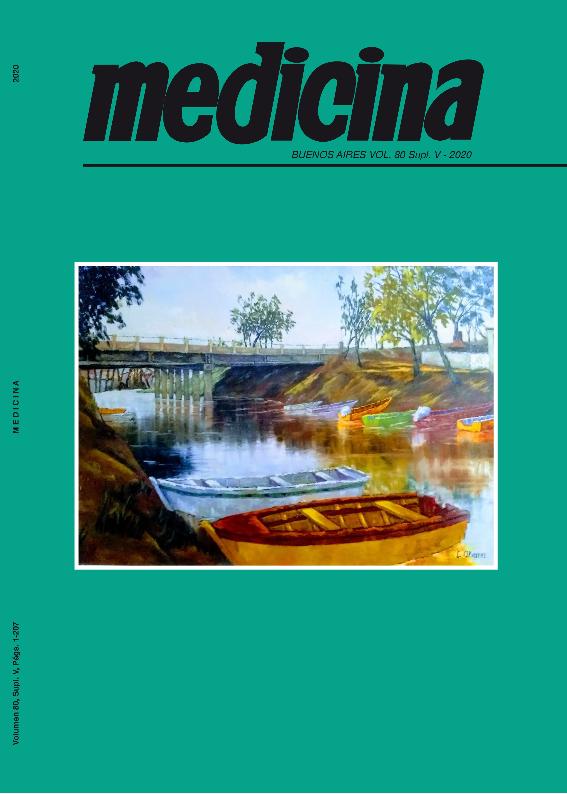Evento
Mom is that you? Proteomic approach to assess the relationship between mesenchymal stem cells and Ewing´s sarcoma cells: tracking the cell of origin
Valenzuela Alvarez, Matias Juan Pablo; Matos, Bruno; Makiya, Monica; Correa, Alejandro; Bolontrade, Marcela Fabiana

Tipo del evento:
Reunión
Nombre del evento:
LXIII Reunión Anual de la Sociedad Argentina de Investigación Clínica (SAIC), LXVIII Reunión Anual de la Sociedad Argentina de Inmunología (SAI), Reunión Anual de la Sociedad Argentina de Fisiología (SAFIS)
Fecha del evento:
10/11/2020
Institución Organizadora:
Sociedad Argentina de Investigación Clínica;
Sociedad Argentina de Inmunología;
Sociedad Argentina de Fisiología;
Título de la revista:
Medicina (Buenos Aires)
Editorial:
Fundación Revista Medicina
ISSN:
0025-7680
Idioma:
Inglés
Clasificación temática:
Resumen
Ewing's sarcoma (ES) is a primitive neuroectodermal tumor that mostly affects children and young adults between 5 and 30 years. Understanding the biology and mechanisms involved in ES growth and progression may lead to the identification of new therapeutic targets. Previous results from our group have shown that a functional link exists between ES and bone marrow (BM)-derived stem cells. In spite of its characterized molecular pathology, many ES development mechanistic aspects remain unknown, without a well-defined etiology, and there is a need to elucidate mechanisms associated to tumor cell survival and cancer progression. Further, markers associated to clinical progression need to be identified. Given that mesenchymal stem cells (MSC) play a central role in regulating osteogenesis and hematopoiesis, sharing functional and hierarchical relationship to ES, we undertook a proteomic analysis with a shotgun approach aimed at comparing BM-MSC and TC71 ES cells. We identified 565 proteins shared by BM-MSC and TC71 cells, while TC71 had 628 and BM-MSC 484 unique proteins. Gene ontology analysis revealed that major differences were found in metabolism pathways, with emphasis in the citric acid cycle, electron transport and ATP synthesis that may relate to the aggressiveness of the disease in terms of rapid growth and metastases development after diagnosis. We also found differences related to protein cellular distribution, with a higher percentage of mitochondrial proteins in ES cells (43,71% TC71 vs 27,86% BM-MSCs), pointing that metabolism governs major divergences in ES cells. In terms of the ES signature EWS-FLl1 translocation that leads to cluster ES tumors as rather homogeneous, further exploration on the transcriptional activity of this oncoprotein in relation to the elusive cell of origin, will lead to improve the management of this sarcoma in soft tissues other than bone, as well as to identify markers associated to progression and therapy response.
Palabras clave:
EWING´S SARCOMA
,
MESENCHYMAL STEM CELL
,
PROTEOMICS
,
ETIOLOGY
Archivos asociados
Licencia
Identificadores
Colecciones
Eventos (IMTIB)
Eventos de INSTITUTO DE MEDICINA TRASLACIONAL E INGENIERIA BIOMEDICA
Eventos de INSTITUTO DE MEDICINA TRASLACIONAL E INGENIERIA BIOMEDICA
Citación
Mom is that you? Proteomic approach to assess the relationship between mesenchymal stem cells and Ewing´s sarcoma cells: tracking the cell of origin; LXIII Reunión Anual de la Sociedad Argentina de Investigación Clínica (SAIC), LXVIII Reunión Anual de la Sociedad Argentina de Inmunología (SAI), Reunión Anual de la Sociedad Argentina de Fisiología (SAFIS); Argentina; 2020; 48-48
Compartir



